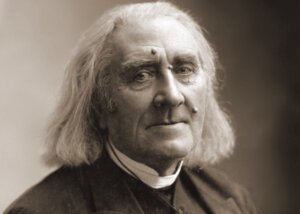Franz Liszt, Biography of a Piano Virtuoso

Franz Liszt was one of the greatest pianists of all time. Not only that, but he was a great human being as well. In fact, Beethoven kissed him on the forehead when he was a child. Furthermore, the great Richard Wagner said that, “Without him, you’d probably never have heard a single note from my pen”.
Liszt was fragile in both health and personality. At the same time, he was extraordinarily intelligent with natural warmth, although he frequently experienced religious outbursts. He was a very religious man. However, he was also an incorrigible seducer of women.
“I carry a deep sadness of the heart which must now and then break out in sound.”
-Franz Liszt-
Unlike some of his contemporaries, Franz Liszt didn’t want to be better than everyone else. As a matter of fact, he celebrated the triumphs of other musicians and helped them improve whenever possible.

Franz Liszt, his infancy
Franz Liszt was born in Raiding, Hungary, on October 22, 1811. Right from birth, he was delicate. He suffered from fevers and was also extremely emotional. In fact, he spent a lot of his childhood confined to a bed. However, once he reached the age of six, his condition stabilized somewhat.
Perhaps these early years contributed to why he wasn’t like other children. From a very young age, he developed a musical talent. He began playing the piano at age seven, guided by his father who was also a musician. His early compositions date back to when he was just eight years old.
At nine, he gave his first recital and amazed his audience. His father then took him to Vienna where he entrusted the musical education of his son to Czerny and Salieri. Historians say that when teachers asked the young Liszt what he wanted to be when he grew up, he pointed to a picture of Beethoven and said “That!”.
Franz Liszt, a musical genius
Franz Liszt achieved momentous success in Vienna. As a matter of fact, it was there that, in front of 4,000 spectators, Beethoven took to the stage after hearing him play, and kissed him on the forehead. Hence, Liszt was blessed with this signal of approval right from the start.
His father then took him to Paris. He achieved considerable success there. By the age of 15, he was considered one of the greatest musical performers. He toured the cities of Europe several times. However, this made him quite ill. In fact, he suffered some kind of mental breakdown and did nothing but pray, fast, and talk to God.
His father then took him to recuperate in the south of France. Liszt recovered, but his father died there. He then returned to Paris where he had to take over the family finances. He was only 16.
Stormy love affairs
Liszt survived largely by giving music lessons to aristocrats. He then met Carolina de Saint-Cricq and fell madly in love with her. However, her family opposed their relationship, and it didn’t last long. Liszt was left greatly depressed.
Years later, after many fleeting affairs, he met Countess Marie d’Agoult. She was older than him and she was married. However, love blossomed immediately, and they fled to Geneva in August 1831. They had three children together.
As Liszt’s compositions matured and became more accomplished, his relationship with Marie deteriorated. In fact, he began to have affairs. One of them was with the famous dancer, Lola Montez. Marie found out about this and she ended their relationship. However, she never forgave Liszt and even tried to ruin his reputation.

His final sadness
Franz Liszt continued to be successful, both as a composer and a performer. After separating from Marie, he wandered around rather aimlessly for a few years. Then, he rediscovered his religious vocation and decided to become an abbot. From that time on, he only composed religious music.
In 1859, his only son, Daniel, died. He was only 20 years old. It was a big blow to Liszt and he never recovered from it. Unfortunately, three years later, his daughter, Blandine, died as well. That only left his daughter, Cosima. She ended up abandoning her husband because she fell in love with Richard Wagner, Liszt’s dear friend.
Liszt never stopped working. He also continued to advise and listen to any other musicians who consulted him. When he turned 60, he suffered from dropsy and was on the verge of death. However, he survived for another 15 years. He died from lung complications, thought to have been brought on by a gust of icy wind on a train journey.
All cited sources were thoroughly reviewed by our team to ensure their quality, reliability, currency, and validity. The bibliography of this article was considered reliable and of academic or scientific accuracy.
- Polls, E. (1999). La creación romántica del artista: la gestación del mito de Franz Liszt o la manipulación de la realidad. Ars Brevis, (5), 149-182.
This text is provided for informational purposes only and does not replace consultation with a professional. If in doubt, consult your specialist.








